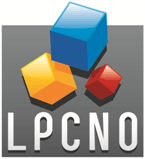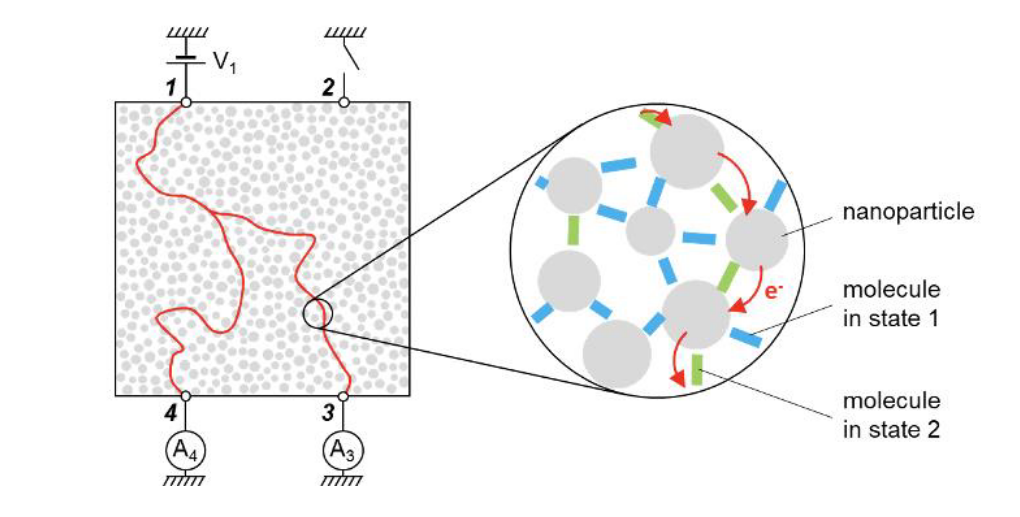NANOSTRUCTURED HYBRID MATERIALS FOR NEUROMORPHIC LEARNING
CHEMISTRY & GREEN CHEMISTRY

Lab: LPCNO
Duration: NanoX master Internship (8 months part-time in-lab immersion)
Latest starting date: 06/10/2025
Localisation: LPCNO Laboratory of physics and chemistry of nanoobjects
INSA, 135, av. de Rangueil
31400 TOULOUSE - FRANCE
Supervisors:
Félix Houard houard@insa-toulouse.fr
Simon Tricard tricard@insa-toulouse.fr
This research master's degree project could be followed by a PhD
Work package:
Artificial neural networks inspired by the functioning of the brain (so-called “neuromorphic”) offer great hope for improving
computing possibilities, to gain in efficiency and power consumption. In order to draw conceptual parallels with the
development of natural neural networks, the bottom-up approach is aimed at developing new materials that take advantage
of the inherent randomness of the systems.
The overall aim of this project is to design and synthesize self-assembled nanostructured hybrid materials and operate them
in charge transport, to control neuromorphic learning based on percolation with plasticity.
Such materials will be prepared by assembling ultra-small metal nanoparticles and switchable molecules. The randomness of
the system will be controlled by chemical tools to create differentiated percolation paths at the mesoscale. A strong attention
will be devoted to preserve the molecular switching – plasticity – within the hybrid materials. The molecular entities will be
chosen so that their switch can be triggered or modulated by physical stimulations: electric field, temperature, light. Part of
the innovative aspect is the extremely simple, versatile and low-cost approach for device preparation, where the materials,
prepared by soft chemistry in solution, can be deposited on any substrate by drop casting. The project will open a new
conceptual approach to research in neuromorphic electronics, where molecular switching will ensure plasticity, and where
controlling structural disorder will help for tuning percolation. Nano-structuration in the hybrid materials will allow an ultimate
scale-down of elementary components for neuromorphic analogy: few molecules for a synapse, nanoparticles of ~100-200
atoms for a neuron.
The internship will be co-supervised by Félix Houard, a senior post-doctorate fellow, and by Simon Tricard, a CNRS research
director. It will take place in the Nanochemistry team of LPCNO, and will combine nanochemistry (vacuum ramp, glove box),
microscopy (TEM, AFM), spectroscopy (IR, UV-Vis, XPS, NMR) and structural studies (XRD, SAXS). The electrical measurements
will be performed in collaboration with the Nanotech team of LPCNO.
Molecular switch in nanostructured hybrid materials for
neuromorphic learning. Materials will be prepared by self-
assembly of nanoparticles and molecules. The conductivity of
the molecules will switch from one state to another under the
effect of an electrical polarization. Percolation with plasticity
will be studied in charge transport to perform operations
inspired by the functioning of the nervous system.

References:
References:
- Manai, G. et al. Bidimensional lamellar assembly by coordination of peptidic homopolymers to platinum nanoparticles. Nat.
Commun. 11, 2051 (2020).
- Gillet, A. et al. Polarizability is a key parameter for molecular electronics. Nanoscale Horiz. 6, 271–276 (2021).
- Marchenko et al. Coordination Bonds as a Tool for Tuning Photoconductance in Nanostructured Hybrid Materials Made of
Molecular Antennas and Metal Nanoparticles, Mater. Horiz. 12, 3429 (2025).
Areas of expertise:
Nanochemistry, neuromorphic electronics, electrical measurements
Required skills for the internship:
Chemistry
